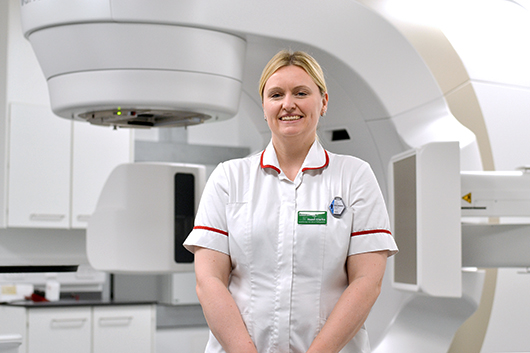Media Release
Date: 17 January 2023
New Radiotherapy Late Effects service launched at the RUH
Patients at the Royal United Hospitals (RUH) Bath NHS Foundation Trust experiencing late side effects following radiotherapy treatment will now benefit from a dedicated new service.

Funded by Macmillan Cancer Support, the Radiotherapy Late Effects Service offers support and guidance for patients who are experiencing long-term side-effects or complications of radiotherapy. This could include medication, therapy support or onward referral to specialist teams within the hospital.
The late effects of radiotherapy (developing six months or longer post-treatment) can vary widely and, depending on the part of the body treated, may include bowel and bladder disorders, pain, swelling, sexual dysfunction and fatigue. These physical symptoms can develop months, years, or even decades after undergoing radiotherapy, and can have a significant impact on a person's quality of life.
Hazel Clarke, Radiotherapy Late Effects Radiographer at the RUH, said: "Radiotherapy is an extremely effective, lifesaving treatment and the majority of people who receive it will not experience any long term side effects. However, this service is here to provide support for those who do.
"Our focus is on improving quality of life for our patients. We really get to know each person, listening to them and understanding what it is that matters to them. This enables us to set personalised goals and we work with the patient to achieve these, improving their symptoms and enhancing their overall wellbeing."
John, 75, from Keynsham, was first diagnosed with prostate cancer in 2013. He initially had a prostatectomy, a procedure in which the prostate in removed, and received the all clear but the cancer returned in 2020. John then underwent radiotherapy which is when he started experiencing late effects.
John said: "For me the effects of radiotherapy happened fairly soon after treatment began and affected my bowels. I suffered from debilitating diarrhoea, I was too nervous to leave my house because I needed to be near a toilet. It was really affecting my quality of life.
"I was referred to the Radiotherapy Late Effects Service and met with Hazel to discuss my history and symptoms. I was prescribed medication which has been transformative but even before this, just having someone to talk to was such a benefit to me. Knowing that I wasn't alone in this and that late effects is a real condition which can be managed was really reassuring.
"Since starting treatment my life has opened up. I've been able to book a holiday for the first time in two years as I finally feel confident enough to get out and about. I would strongly encourage anyone who think they might be experiencing late effects to reach out to the service for help."
People who are experiencing late effects can self-refer by emailing ruh‑tr.RTLateEffects@nhs.net or calling 01225 824853. Alternatively, people can be referred by a healthcare professional such as their GP.
The RUH Radiotherapy Late Effects Service is part of the wider South West Late Effects service established with funding support from Macmillan Cancer Support.
ENDS

